|
|
|
Sort Order |
|
|
|
Items / Page
|
|
|
|
|
|
|
| Srl | Item |
| 1 |
ID:
154851


|
|
|
|
|
| Summary/Abstract |
Since the 3/11 compounded disasters, Japanese energy policy, especially its nuclear policy, has been paralyzed. After the Fukushima disasters, public opinion turned against nuclear energy while the central government continued to push for restarts of the many offline reactors. Based on nearly thirty interviews with relevant actors and primary and secondary materials, we use qualitative comparative analysis (QCA) and five case studies to illuminate the impact of conditions influencing reactor restarts in Japan after 3/11. We investigate which local actors hold the greatest power to veto nuclear power policy, and why and when they choose to use it. Key decisions in nuclear power policy involve approval from multiple institutions with varying legal jurisdiction, making vetoes the result of multiple actors and conditions. Certain legal and political factors, such as court, regulator, and gubernatorial opposition (or support), matter more than technical factors (such as the age of the reactor or its size) and other political factors (such as town council or prefectural assembly opposition or support). Local politics can stymie a national government’s nuclear policy goals through combinations of specific physical conditions and vetoes from relevant actors, rather than through the actions of local opposition or single “heroic” governors. Our findings challenge the assumption that utilities unilaterally accept a governor’s vetoes, but reinforce the notion that specific judicial and electoral veto players are blocking an otherwise expected return to a pro-nuclear status quo.
|
|
|
|
|
|
|
|
|
|
|
|
|
|
|
|
| 2 |
ID:
168790
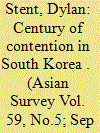

|
|
|
|
|
| Summary/Abstract |
This paper examines a century of contentious politics in South Korea. I argue that there have been three distinctive eras of contention in modern Korea. The first two eras saw institutional arrangements limit the success of contentious campaigns. However, expanded repertoires in the third era allowed movements to succeed. I end by examining the role of social media in future movements.
|
|
|
|
|
|
|
|
|
|
|
|
|
|
|
|
| 3 |
ID:
158589
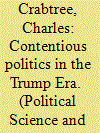

|
|
|
| 4 |
ID:
152660
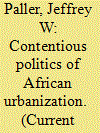

|
|
|
|
|
| Summary/Abstract |
“The prospects for sustainable urban development are embedded in larger political struggles.”
|
|
|
|
|
|
|
|
|
|
|
|
|
|
|
|
| 5 |
ID:
170375
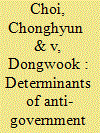

|
|
|
|
|
| Summary/Abstract |
What determines cross-national variations in the extent of anti-government protests in Asia? Anti-government protests have surged across Asia in recent years, with many contributing to consequential political change. However, systematic cross-national comparison of the determinants of protests in Asia is still largely missing. This article fills this important gap by quantitatively examining the explanatory power of the three main theories of contentious politics—grievance, resource mobilization, and political process theories—in the Asian context with new data on anti-government protests in all 25 Asian states from 1990 to 2016. The analysis finds that urbanization, information and communication technology, and regional demonstration effects are the strong catalysts of anti-government protests in Asia, while repressive state capacity particularly dampens protests. The findings offer important insights into the dynamics of the anti-government protests that have become increasingly salient in Asian politics.
|
|
|
|
|
|
|
|
|
|
|
|
|
|
|
|
| 6 |
ID:
175527
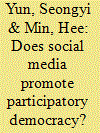

|
|
|
|
|
| Summary/Abstract |
This study examines whether social media contributed to the success of the Korean presidential impeachment protests of 2016–17 and promoted participatory democracy. The 2016–17 candlelight protests contributed to the overthrowing of a corrupt regime. However, was it a victory of participatory democracy? To answer this question, we must first be clear on what kind of participatory democracy is being referred to. Therefore, while social media played a crucial role in the success of the protests, the impact of social media on participatory democracy should be addressed separately. For this purpose, we first analyse the contributions of the digitally connected movements during the 2016–17 protests with two social movement theories: resource mobilisation and collective identity. Second, we examine whether the success of digitally connective movements during those protests promoted participatory democracy. To discuss this issue, we use Arnstein’s concept of a ‘ladder of participation’, which describes participatory democracy as falling within three levels, from non-participation through tokenism to citizen power. This study shows that the proliferation of social media politics by itself does not convert representative democracy into participatory democracy. This implies that even if social media augments citizens’ power of resistance, it cannot transform citizens into a governing power.
|
|
|
|
|
|
|
|
|
|
|
|
|
|
|
|
| 7 |
ID:
145147
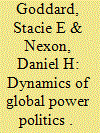

|
|
|
|
|
| Summary/Abstract |
We call for a research program focused on the dynamics of global power politics. Rather than link realpolitik to structural-realist theoretical frameworks or the putatively anarchical character of world politics, the program treats power politics as an object of analysis in its own right. It embraces debate over the nature of global power politics among scholars working with distinctive approaches. It sees the structural contexts of power politics as highly variable and often hierarchical in character. It attenuates ex ante commitments to the centrality of states in global politics. And it takes for granted that actors deploy multiple resources and modalities of power in their pursuit of influence. What binds this diverse research program together is its focus on realpolitik as the politics of collective mobilization in the context of the struggle for influence among political communities, broadly understood. Thus, the study of the dynamics of collective mobilization—the causal and constitutive pathways linking efforts at mobilization with enhanced power—brings together approaches to security studies in a shared study of power politics.
|
|
|
|
|
|
|
|
|
|
|
|
|
|
|
|
| 8 |
ID:
120768


|
|
|
|
|
| Publication |
2013.
|
| Summary/Abstract |
This article explores those factors that shape a political organization's choice of tactics in political mobilization with a particular focus on the influence of gender ideology on the choice of different type of contentious action. To understand why political organizations engaging in contentious politics choose to employ violent tactics, nonviolent tactics, or a mixture of both, current scholarship has tended to focus on factors such as relationship with the government, external support, and religious or leftist ideology. Far less attention has been given to the role of an organization's ideology relating to gender when predicting its behavior. In addition, much of the analysis of contentious activity has analyzed the use of violence or protest separately and rarely examines the choice of a mixed strategy. We employ a time-series multinomial logistic regression analysis to examine the Middle East Minorities at Risk Organizational Behavior dataset (MAROB), including data over 24 years on 104 ethno-political organizations that have used a range of tactics including protest, violence, and/or a mix of the two, to investigate organizational and state-level variables that lead organizations to choose different strategies. We find that a number of variables can influence a movement's choice to engage in one strategy over another. Gender-inclusive ideology makes an organization more likely to engage in protest and less likely to choose a violent or mixed strategy.
|
|
|
|
|
|
|
|
|
|
|
|
|
|
|
|
| 9 |
ID:
186568


|
|
|
|
|
| Summary/Abstract |
While processes of land-use change have triggered conflicts across Asia, our knowledge of the responses of affected communities is largely based on case-studies. This review essay addresses this challenge by reviewing and synthesizing 49 studies of conflicts between rural communities and companies in order to identify salient characteristics of anti-corporate activism in Indonesia. We find that, in contrast to the ‘rightful resistance’ observed elsewhere, the strategies employed by rural communities in Indonesia are remarkably “rightless” as both their discourse and their conflict resolution efforts are marked by a remarkable irrelevance of laws, regulations and courts. Communities frame their claims mostly in terms of customary laws while largely relying on informal mediation by local authorities. We attribute this “rightless” character of land-use change conflicts to the weak legal protection of land rights in Indonesia and the relative powerlessness of communities in the face of collusion between authorities and companies.
|
|
|
|
|
|
|
|
|
|
|
|
|
|
|
|
| 10 |
ID:
161652
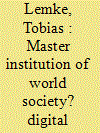

|
|
|
|
|
| Summary/Abstract |
In English School theory, the putative change from an international society of states to a world society of individuals is usually associated with the diffusion of a benign form of cosmopolitanism and the normative agenda of solidarism. Consequently, the notion that world society might enable alternative expressions of transnational politics, independent from international society, remains underdeveloped. Drawing on the literature of contentious politics and social movements, this article challenges orthodox accounts and suggests that the global proliferation of digitally mediated linkages between individuals and nonstate actors constitutes a fundamental challenge to traditional dynamics of interstate communication in the form of the diplomatic system. This provides an opportunity to reconceptualize world society as an alternative site of politics distinct from mainstream international society and generative of its own logic of communication, mobilization, and action. The 2011 events in Egypt and the ongoing digital presence of the so-called Islamic State are used to demonstrate how massive increases in global interaction capacity are transforming the pathways for political contention and collective mobilization worldwide.
|
|
|
|
|
|
|
|
|
|
|
|
|
|
|
|
| 11 |
ID:
164807
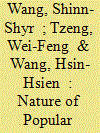

|
|
|
|
|
| Summary/Abstract |
While China’s economic reforms have produced undeniably positive outcomes, a rapid increase in popular protests has become most striking in recent years. As protests grow steadily in both scale and frequency, the government continues to tout social stability as the chief concern of China today. These mounting tensions reflect a direct clash of horns between the maintenance of stability and the public’s desire to exercise their rights, frequently culminating in acts of repression by the Chinese state in order to quell the unrest. This raises an important question: how can the relationship between repression and popular protest in China be characterized? More specifically, which precise circumstances of popular protest elicit the employment of China’s repressive state capacity? Taking into account both theoretical perspectives and empirical analysis, this paper attempts to elucidate the issue by first collating a large body of data to clarify the precise characteristics of popular protest, then undertaking quantitative analysis to identify which factors trigger the mobilization of China’s machinery of repression. Furthermore, this study identifies that in recent years, the use of state repression has risen in parallel with an increasing emphasis on the principle of “maintaining social stability” in China.
|
|
|
|
|
|
|
|
|
|
|
|
|
|
|
|
| 12 |
ID:
173639
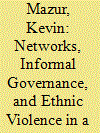

|
|
|
|
|
| Summary/Abstract |
In cross-national studies, ethnic exclusion is robustly associated with the onset of violent challenge to incumbent regimes. But significant variation remains at the subnational level—not all members of an excluded ethnic group join in challenge. This article accounts for intra-ethnic group variation in terms of the network properties of local communities, nested within ethnic groups, and the informal ties that regimes forge to some segments of the ethnically excluded population. Mobilization within an excluded ethnic group is most likely among local communities where members are densely linked to one another and lack network access to state-controlled resources. Drawing on a case study of the Syrian city of Homs in the 2011 uprising, this article demonstrates how the Syrian regime’s strategies of managing the Sunni population of Homs shaped patterns of challenge. On the one hand, the state’s toleration of spontaneous settlements on the city’s periphery helped to reproduce dense network ties. On the other hand, the regime’s informal bargains with customary leaders instrumentalized those ties to manage local populations. These bargains could not withstand the regime’s use of violence against challengers, which meant that these same local networks became crucial factors in impelling and sustaining costly antiregime mobilization.
|
|
|
|
|
|
|
|
|
|
|
|
|
|
|
|
| 13 |
ID:
141231
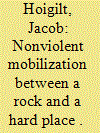

|
|
|
|
|
| Summary/Abstract |
Recent research on contentious politics in the Middle East emphasizes the importance of repression and its effect on social movements, often manifested in demobilization and so-called ‘nonmovements’. This case study of West Bank Palestinian activism seeks to go beyond such outcomes. The current, youthful nonviolent Palestinian grassroots activism in the West Bank is persistent, despite repeated violent repression. Focusing on the interplay between context, practices, and networks, this article shows how an increasingly vocal and visible popular resistance movement has asserted itself despite facing double repression – from the occupying Israeli state and the Palestinian National Authority. In a highly repressive context characterized by widespread demobilization, especially among young people, the impetus for mobilization is not perceived opportunity, but rather existential threats. The analysis focuses on how long-term repression from the external occupier and the internal elite contributes to forming specific kinds of contentious practices and networks among young Palestinian grassroots activists. By deploying new and creative contentious tactics they partly succeed in challenging the Israeli occupation without risking sanctions from the internal Palestinian elite. They are also able to criticize this elite implicitly, bringing popular pressure to bear on it. However, while the strategic use of nonviolence has provided these activist environments with a degree of resilience in the face of repression, they are unable to mobilize on a wide scale as long as the Palestinian political elite does not support them.
|
|
|
|
|
|
|
|
|
|
|
|
|
|
|
|
| 14 |
ID:
161143


|
|
|
|
|
| Summary/Abstract |
This essay explores the relationship between the collapse of negotiations between Turkey and the PKK and the rupture between the governing AKP and its former ally, the Cemaat or Gülen Movement. This schism transformed both the AKP regime and Kurdish politics. This article traces the shifting narratives of key actors in this process. It also identifies the multifaceted underpinnings of the political violence that erupted and disrupted the resolution/peace process. In the end, the peace/resolution process was a (re)entrenchment, or inadvertent re-positioning of violent means of suppression against Kurdish politics in Turkey, beyond the particular intentions, beliefs, ideas and attitudes of all parties.
|
|
|
|
|
|
|
|
|
|
|
|
|
|
|
|
| 15 |
ID:
137206
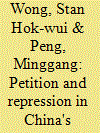

|
|
|
|
|
| Summary/Abstract |
China has established a petition system to elicit information about grievances. However, the petition system may have perverse effects because it also reveals to the center the failure of local-level officials to resolve those grievances. Anecdotal accounts suggest that local officials have incentive to silence petitioners, often with the use of repression. In this article we study whether non–regime threatening petitions would provoke local governments' coercive response. To tackle the endogenous relationship between petition and repression, we take advantage of a natural experiment afforded by a change in hydroelectricity policy in China. In particular, we use provincial hydropower outputs as an instrument to identify citizen petitions. We find that citizen petitions significantly increase a province's spending on its repressive apparatus. The results suggest a paradoxical outcome of China's petition system: while it may help reduce the national authority's use of repression, it has caused an explosion of repression within the authoritarian system as a whole.
|
|
|
|
|
|
|
|
|
|
|
|
|
|
|
|
| 16 |
ID:
094447
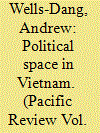

|
|
|
|
|
| Publication |
2010.
|
| Summary/Abstract |
Single-party, authoritarian states such as Vietnam are frequently characterised as having 'closed' political opportunity structures and 'un-free' socio-political systems. The validity of this observation depends, however, on the viewer's frame of reference. Seen from the perspective of active citizens, Vietnamese political structures offer increasingly greater space for collective action than a state-centred institutional analysis would predict. Episodes of contentious politics surrounding land disputes and public parks during 2007 provide evidence of the changing dynamics of participation in politics. Actors involved in these and similar campaigns are broadly optimistic about the future prospects for an opening of political space within the existing system. These findings are contrasted with international reports of violations of political rights and with the Vietnamese government's own efforts at legal reform. Although signals remain mixed, to some extent Vietnam might be becoming a 'rice-roots democracy' in practice, while remaining a single-party state. The voices and experiences of civil society actors will continue to shape opportunities and risks in the expansion of political space.
|
|
|
|
|
|
|
|
|
|
|
|
|
|
|
|
| 17 |
ID:
145466
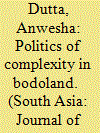

|
|
|
|
|
| Summary/Abstract |
The 2014 Lok Sabha elections witnessed a significant shift in the political spectrum of the Bodo Territorial Autonomous District (BTAD) in Assam, with non-Bodos voting en masse for an independent candidate, a former United Liberation Front of Assam (ULFA) militant who was backed by a collective of non-Bodo organisations. Using the elections as a focal point, this paper aims to explore the larger political dynamics, political mobilisation and shifting alliances within a framework of contentious politics and collective action that unfurled during the elections and eventually led to an episode of targeted violence against the Muslim community in BTAD.
|
|
|
|
|
|
|
|
|
|
|
|
|
|
|
|
| 18 |
ID:
131818
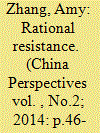

|
|
|
|
|
| Publication |
2014.
|
| Summary/Abstract |
This article examines the logic and framing of homeowner protests against Waste to Energy (WTE) incineration in Guangzhou. I argue that the concept of "rational resistance" emphasised by homeowner activists represents one way of understanding urban environmental contention in China. Urban homeowners use rational resistance to distinguish themselves from both villagers and the state. Their focus on rationality is a critique of the government's reliance on technology to resolve the social problem of waste management.
|
|
|
|
|
|
|
|
|
|
|
|
|
|
|
|
| 19 |
ID:
178605


|
|
|
|
|
| Summary/Abstract |
This article explores the dynamics of state-formation in Turkey during the AKP regime by questioning its claim of an almost two decades long continuity heading towards the centennial of the Republic of Turkey in 2023. Eclectically drawing on four different, yet related, theories of conflict, power and (visual) narrative; i.e. Gramscian ‘war of position,’ Contentious Politics perspective of (de)democratization, dialogical principle and visuality, the article presents a comparison of the claim-making of the two official publications; now defunct the Silent Revolution, and Towering Power Turkey, published in 2013 and 2018, respectively, to demonstrate the contrast between the pre-hegemonic and hegemonic self-presentation claims of the AKP regime, and indicates that its regime change is the re-entrenchment of many of the postulates of the Kemalist regime it originally aspired to challenge. The tenets of this analysis is located within the intersection of political sociology and cultural studies.
|
|
|
|
|
|
|
|
|
|
|
|
|
|
|
|
| 20 |
ID:
190402
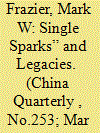

|
|
|
|
|
| Summary/Abstract |
The watershed in modern Chinese politics known as the May Fourth Movement (1919) offers insights into how a single protest event can quickly diffuse to other regions, draw in new participants and produce legacies in contentious politics. This article examines the May Fourth protests from the perspective of “eventful sociology” – an approach that examines how protests, repression and other contingent events link together to bring about landmark political episodes. It traces the sequence of protest and repression events in Beijing and draws on an original database of protest and repression events in Shanghai to emphasize the haphazard sequencing of actions and information flows that led the Chinese government to reverse its stance and concede to protestors’ demands. An eventful account illustrates how past protest sequences can produce a long-term impact on subsequent protest events. It also calls for greater awareness of “single sparks” that initiate protest sequences and unexpected political outcomes.
|
|
|
|
|
|
|
|
|
|
|
|
|
|
|
|
|
|
|
|
|